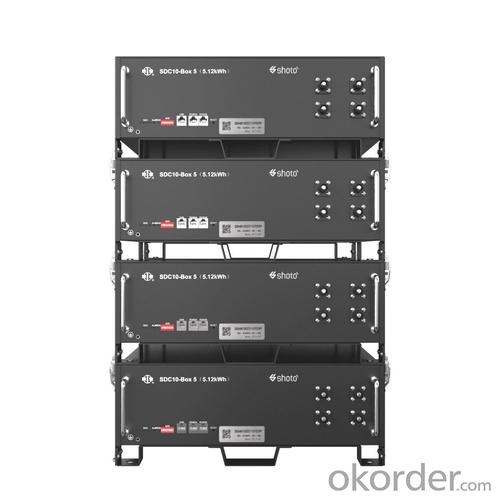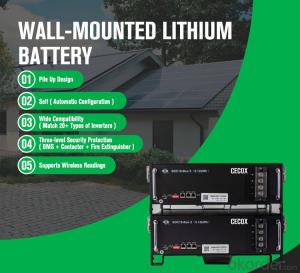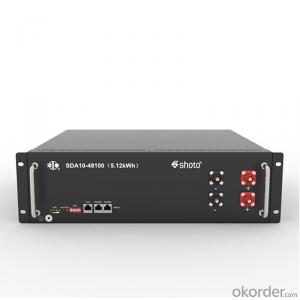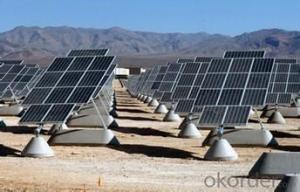Solar Energy Systems Skagit UL Certificate 5.12kwh Shoto 51.2V 100Ah 6000 Cycles @80% DOD 5 Years Warranty Lithium Battery
- Loading Port:
- SHANGHAI
- Payment Terms:
- TT OR LC
- Min Order Qty:
- 50 set
- Supply Capability:
- 5000 set/month
OKorder Service Pledge
Quality Product, Order Online Tracking, Timely Delivery
OKorder Financial Service
Credit Rating, Credit Services, Credit Purchasing
You Might Also Like
Specification
Application:
Home
Output Voltage (V):
51.2v
Introduction:
Solar energy preferably used by domestic appliances, and additional Energy is stored in battery.
During the day, when battery is fully charged, the additional energy produced by solar can be sold and fed into the public .
At evening, the energy stored in the battery supplies electriciity to the domestic appliances.
At night, when the energy stored in the battery is depleted, the public grid supplies energy to the domestic appliances.
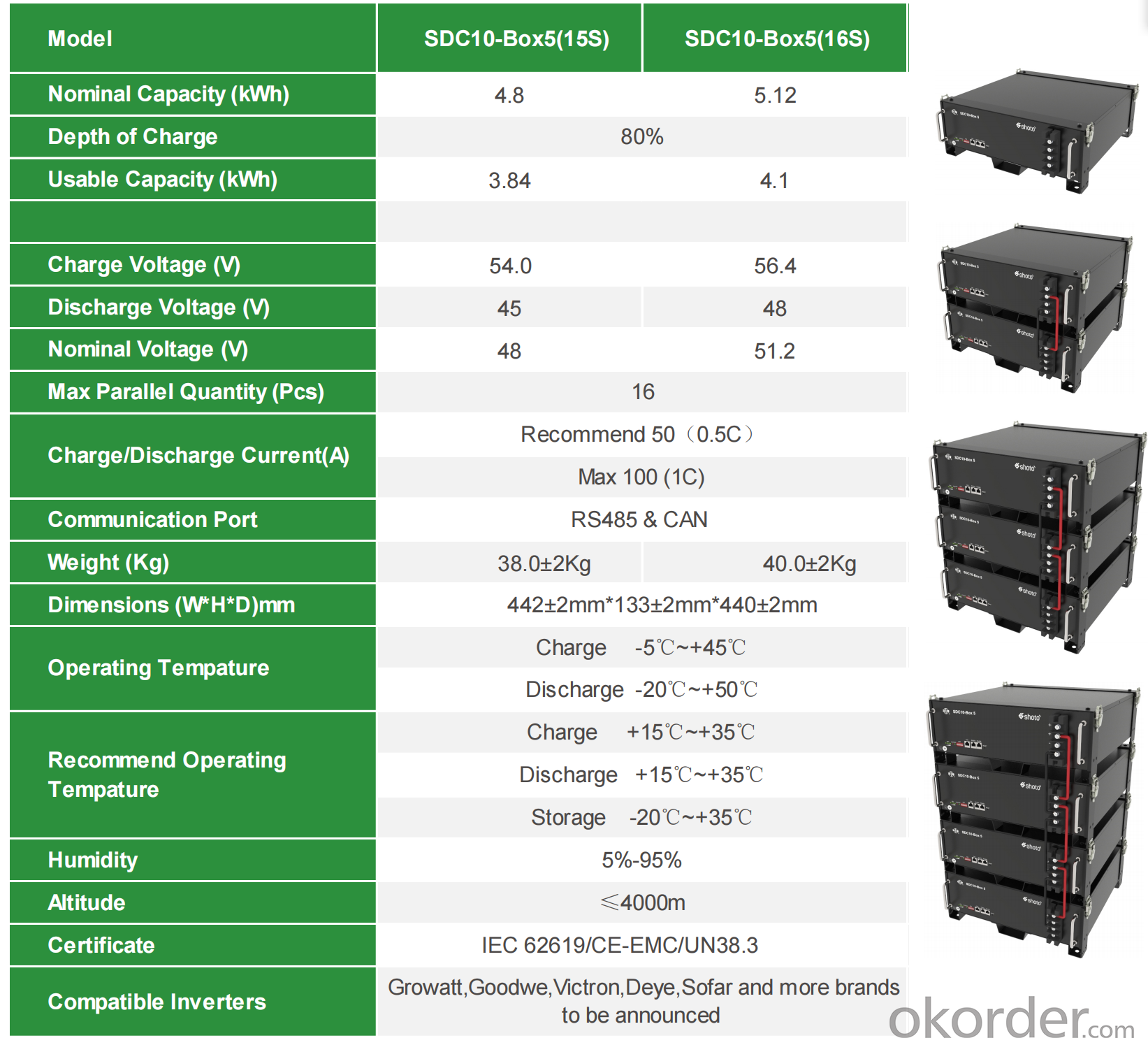
- Q: Can solar energy systems be used for powering electronic devices?
- Yes, solar energy systems can be used to power electronic devices. Solar panels can convert sunlight into electricity, which can then be used to charge and power various electronic devices such as smartphones, laptops, and even larger appliances like refrigerators and air conditioners.
- Q: Can solar energy systems be used in areas with limited access to solar energy incentives and rebates?
- Yes, solar energy systems can still be used in areas with limited access to solar energy incentives and rebates. While incentives and rebates can make solar installations more affordable, the feasibility of solar energy systems depends on factors such as the availability of sunlight and the cost of traditional energy sources. In areas with limited solar incentives, the decision to install solar panels should be based on factors like long-term cost savings, energy independence, and environmental benefits. Additionally, advancements in solar technology and decreasing costs make solar energy a viable option even without incentives.
- Q: Can solar energy systems be used in areas with limited access to solar energy support networks?
- Yes, solar energy systems can be used in areas with limited access to solar energy support networks. Off-grid solar systems, also known as standalone systems, are designed to operate independently without being connected to an electricity grid. These systems can be installed in remote areas or places with limited infrastructure, allowing them to harness and store solar energy for use in powering homes, businesses, or other applications. Additionally, advancements in solar technology have made it possible to use smaller and more efficient solar panels, making them suitable for areas with limited solar resources.
- Q: Can solar energy systems be used in powering restaurants or food chains?
- Solar energy systems are a viable option for providing power to restaurants and food chains. They are an eco-friendly and sustainable source of energy that can effectively reduce operational expenses and minimize the environmental impact of these establishments. Solar panels can be installed on rooftops or in open areas to capture sunlight and convert it into electricity, which can then be utilized for various functions within restaurants, including lighting, refrigeration, cooking equipment, and air conditioning. By adopting solar power, restaurants and food chains not only save on their energy bills but also showcase their dedication to sustainability and environmentally-conscious practices. Moreover, certain governments offer incentives and tax advantages to businesses that opt for solar energy systems, making it an even more appealing choice. All in all, solar energy systems are a practical and eco-friendly solution for powering restaurants and food chains.
- Q: How does net metering work?
- Net metering is a billing arrangement that allows customers with solar panels or other renewable energy systems to receive credit for any excess electricity they generate and feed back into the grid. The electricity meter measures the difference between the energy consumed from the grid and the energy generated by the customer's system. This net difference determines the amount of energy credited or charged to the customer's account. In essence, net metering enables homeowners to offset their electricity costs and promotes the adoption of clean energy sources.
- Q: Are there any limitations to using solar energy for powering vehicles?
- Yes, there are limitations to using solar energy for powering vehicles. Some of the main limitations include the intermittent nature of solar power, as it is dependent on weather conditions and daylight availability. This makes it challenging to consistently generate sufficient energy for continuous vehicle operation. Additionally, solar panels take up a significant amount of space, which can be impractical for smaller vehicles with limited surface area. Moreover, the energy conversion efficiency of solar panels is relatively low, resulting in less power output compared to conventional fuel sources. Lastly, the initial installation cost of solar panels and the associated infrastructure can be expensive, making it less economically viable for widespread adoption in the automotive industry.
- Q: Can solar energy systems be used in areas with limited access to solar mounting systems?
- Yes, solar energy systems can still be used in areas with limited access to solar mounting systems. There are alternative mounting options available such as ground-mounted systems, pole-mounted systems, or even floating solar panels. These alternatives allow solar energy systems to be deployed in various locations, even in areas where traditional mounting systems may not be feasible or accessible.
- Q: Can a solar energy system power an entire home?
- Yes, a solar energy system can power an entire home. With advancements in solar technology, it is now possible to generate enough electricity from solar panels to meet the energy needs of a typical household. A solar energy system consists of solar panels that convert sunlight into electricity, an inverter that converts the DC electricity generated by the panels into AC electricity for use in the home, and a battery storage system to store excess energy for use during cloudy or low sunlight periods. The size and capacity of the solar energy system will depend on the energy requirements of the home. Factors such as the number of occupants, energy consumption patterns, and the availability of sunlight in the area will determine the number of solar panels needed. It is essential to conduct a thorough energy audit to determine the appropriate system size. By installing a solar energy system, homeowners can significantly reduce or eliminate their dependence on the traditional electrical grid. In some cases, excess electricity generated by the system can be sold back to the grid, leading to potential cost savings. Additionally, solar energy is a clean and renewable source of power, reducing carbon emissions and benefiting the environment. However, it is important to note that the efficiency and effectiveness of a solar energy system can be influenced by various factors such as the location and orientation of the panels, the amount of sunlight available, and the weather conditions. Therefore, it is advisable to consult with a professional solar installer to design and install a system that meets the specific needs of the home.
- Q: Can a solar energy system be installed on a church or religious building?
- Yes, a solar energy system can be installed on a church or religious building. In fact, many religious organizations have started to embrace solar energy as a sustainable and environmentally friendly solution to reduce their carbon footprint and lower their energy costs. Installing solar panels on the roof of a church or religious building can generate clean and renewable energy, which can be used to power the facility and reduce its reliance on traditional energy sources. Additionally, by going solar, religious organizations can set an example for their communities and inspire others to adopt clean energy practices.
- Q: Can solar energy systems be used for powering off-grid mining operations?
- Yes, solar energy systems can be used for powering off-grid mining operations. Solar power can provide a reliable and sustainable source of electricity to mining operations in remote areas where grid connections are either unavailable or unreliable. By harnessing the power of the sun, solar energy systems can generate electricity to meet the energy demands of mining operations, reducing their dependence on expensive and polluting fossil fuels. Additionally, solar energy systems can be customized to suit the specific energy requirements of mining operations, making them a viable and environmentally-friendly alternative for off-grid power supply.
Send your message to us
Solar Energy Systems Skagit UL Certificate 5.12kwh Shoto 51.2V 100Ah 6000 Cycles @80% DOD 5 Years Warranty Lithium Battery
- Loading Port:
- SHANGHAI
- Payment Terms:
- TT OR LC
- Min Order Qty:
- 50 set
- Supply Capability:
- 5000 set/month
OKorder Service Pledge
Quality Product, Order Online Tracking, Timely Delivery
OKorder Financial Service
Credit Rating, Credit Services, Credit Purchasing
Similar products
Hot products
Hot Searches
Related keywords






